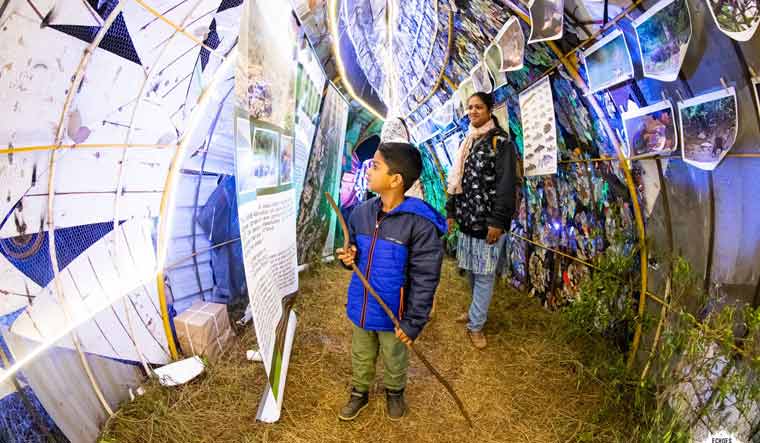Last December, over 20,000 people flocked to India’s greenest music festival in Bengaluru—the Echoes of Earth. It was a two-day extravaganza of art, music, culture and conservation. The sound of music and merriment spilled from the 180-acre expanse of the Embassy International Riding School, as the audiences swayed to jazz, techno, blues, reggae and rock.
The festival is now back in its sixth edition, on December 2 and 3. If the theme last year was ‘Circle of Life’, this time it is ‘Ensemble of the Wild’—an ode to the Western Ghats. The mountain range has been recognised by the UNESCO as one of the world’s eight ‘hottest hotspots’. Environmentalists might have a role to play in conserving its beauty and biological diversity, but perhaps, so do the rockstars. The hills must be alive with the sound of their music.
The idea for the festival originated from Roshan Netalkar’s years in the event management industry, which included everything from house parties to exhibitions. By some estimates, the industry will be worth $7.6 trillion by 2030. That growth has resulted in an alarming amount of waste, from plastic bottles and unused food to decorative items and branding elements.
“The festival is woven around the larger message of responsible celebration,” says Netalkar. “While it would take a month to curate any other music festival, this is a year-long exercise. Last year we did an on-ground audit of the waste we generated. This year we will look into the larger carbon footprint.”

In the last edition, 80 per cent of all festival assets, most significantly art installations, were created using old, discarded, recycled, and upcycled material. Plastic water bottles were replaced with RO water filters onsite. Wet waste was composted, and dry recycled.
Around 10 per cent of the festival’s power needs this year will be met with solar energy. Workshops for children, brunch with performing artistes, and a carefully curated flea market with organic, natural, artisanal and handmade products are also part of the festival mix. And yes, there will be electric charging points for vehicles.
One could, of course, raise all those grey zone questions, like the carbon footprint of artistes flying in from across the world. There are no quick and easy answers. For now, there is a sapling planted for every ticket sold, but Netalkar is acutely aware of the festival’s slow march to becoming completely circular.
This year’s artiste lineup includes the likes of Carnatic musician and music producer Sid Sriram; desert blues band Tinariwen from the Sahara region of northern Mali; Turkish DJ Len Faki; Ukrainian sound producer Iryna Shvydka; New York-based multi-instrumentalist Jitwam; and Sri Rama Murthy, aka Murthovic, an electronic music composer, sound designer and DJ from Hyderabad.
There are both Western classical and Carnatic music influences in Murthovic’s work. He traces the ‘natural progression’ of his interest in the environment as a musical theme, from the childlike wonder of seeing a touch-me-not to the study of environmental sciences at university. “This connection goes beyond just plants to things like percussion instruments made from natural resources like wood. It is a holistic appreciation for the beauty of nature in various forms,” says Murthovic.
 Sri Rama Murthy, aka Murthovic
Sri Rama Murthy, aka Murthovic
There is always a thin line between entertaining and sermonising that music of this kind must tread, especially with the youth who have short attention spans. But Murthovic does not find this a challenge “as long as the music has an interesting groove, rhythm, melodic motif and some kind of storytelling element”. According to him, you can only entertain when you can make the audience feel what you are feeling. “When it actually works, it goes beyond being a mere set,” he says. “It becomes a narrative that exudes core values and tells a unique story. Striking a balance between storytelling, quirkiness, an off-centre approach, relevance, and other artistic choices is where the magic happens.”
One of the most interesting bands to play at the festival is Matsumoto Zoku, of Japanese origin. The four-member group does human beat-making, and plays the wind instrument didgeridoo and the hand pan—a round bowl played with sharp taps.
Band members say that the earth has been a big concern in their musical journey, impacting their “inner core”. They say that they do not care who listens to their music, but only its potential to improve people’s lives. For them, the music and the message are inextricably linked. “The message is in our core [at the] unconscious and subconscious level,” says Reo Matsumoto, the group’s co-founder. “Entertaining [through music] exists at the conscious level. It comes through our live shows. We entrust it to the audience.”
For Netalkar, the music must always be centre-stage. “Between having a big name associated with us or putting music at the top, music will always be our choice,” he says. A green festival might not be the norm in a country famous for its excess; still, four state governments have approached the team to bring it to their regions. The next obvious destination is the country’s music capital, Goa. But, as the festival team envisages, its sounds of sustainability are destined to travel farther and wider.



